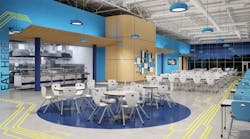Latest from Industry
Electrical Marketing - March 14, 2025
New Data for Electrical Product Sales Estimates
Rep & NEMRA News
Eaton Corp., Dublin, Ireland, said it intends to pursue a tax-free spin-off of its Lighting business. The spin-off will create an independent, publicly traded company and is expected to be completed by the end of 2019.
The move will create a stand-alone powerhouse in luminaires and controls with a package of brands mostly built by Cooper Industries, which Eaton acquired in 2012, including Halo, Metalux, McGraw-Edison, Neo-Ray, Lumiere, Lumark, Pauluhn, Corelite, Ephesus and AtLite.
In a letter to customers and channel partners, Eaton Lighting President Kraig Kasler and VP of Sales Joe Melchiors said the spin-off includes Eaton’s Lighting business, global Airport Lighting business, and the Mains Lighting and Intrusion Systems businesses that operate primarily in Europe and the Middle East. The Crouse-Hinds Industrial Lighting business and the Life Safety division’s emergency lighting product lines in Europe, the Middle East and Africa will remain with Eaton.
Eaton’s move, of course, follows a worldwide trend of major industrial conglomerates parting ways with the lighting business as LED technology has dramatically changed the market’s dynamics. Philips, Siemens and GE have all gone down this path in their own ways. What once was seen as a bread-and-butter consumable has shifted to products lasting as much as 10 years and an influx of competition has compressed margins to levels that don’t fit well with the conglomerates’ growth requirements.
What has surprised some in the industry is that Eaton held on to the lighting business for so long after acquiring Cooper. “I expected them to divest within a year or so, when they bought it,” said Ted Konnerth, CEO of electrical industry executive staffing firm Egret Consulting and a former Cooper Lighting executive. “I don’t think the lighting division was doing well at that time, but it’s back to being profitable now.”
Konnerth observed that main-line electrical equipment manufacturers often have trouble with the lighting business because the channels through which lighting is sold are so varied and different from the traditional electrical supply channel. Traditional electrical distribution plays an important role but idiosyncrasies such as overage payments in the rep-driven commercial and industrial construction market, along with all the other channels with their own distinct buying influences that could require a separate sales force, make a challenging fit for a business accustomed to selling through the traditional channels.
In the letter to customers and channel partners, Kasler and Melchiors said the spin-off “better positions the Lighting business to respond to evolving industry and customer needs. It enables Lighting to compete more effectively across its diverse end-markets, and it enhances Eaton’s ability to focus investments in its core businesses.”
The Eaton Lighting business had sales of $1.7 billion in 2018. As a stand-alone business it will have 5,000 employees, global headquarters in Ireland and U.S. headquarters in Atlanta.









